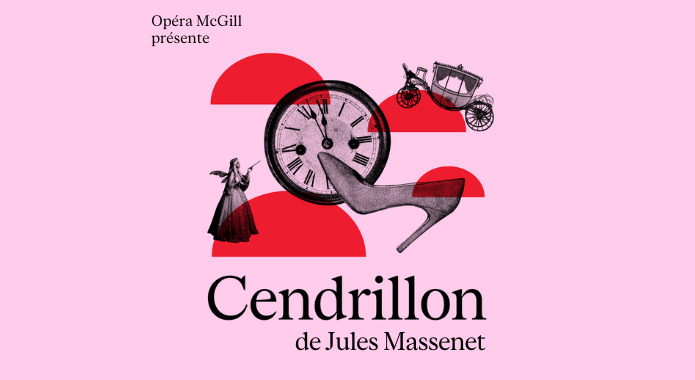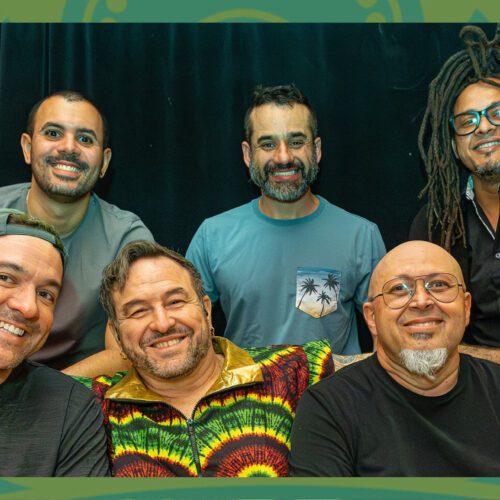Additional Information
Every year, McGill Music students, graduate and undergraduate alike, come together to stage an opera. This season, Cendrillon, by French composer Jules Massenet, will take the stage at the Monument-National. This opera is remarkable in its scale: many singers are required. A notable challenge, that even professional opera companies rarely decide to take on.
At the source of this production are Stephen Hargreaves, Opera McGill’s director, and David Lefkowich, guest stage director. Having both many years of experience in directing and staging operas, both locally and internationally, both on the professional level and in university settings, they took on the challenge of Cendrillon. This was their first time working with this piece, which they however already knew and loved.
PAN M 360 had the chance to talk to them a few days before the opening night. We spoke about their work together, what makes this opera by Massenet so unique, and their common concern to create the best environment in which the students can learn and develop their art.
PAN M 360: Thank you so much for being here today! How are the last rehearsals going?
DAVID LEFKOWICH: It’s been fantastic! I think the students are really rising to the challenge that Massenet has presented us, it is really exciting to see them all sort of blossom within the last few weeks.
STEPHEN HARGREAVES: Yeah. In many ways, this is a stretch for McGill and Opera McGill. And it’s a good bit. It’s one of those things where it asks a lot of people to do a lot of things on stage. There are a lot of students for whom this is their first experience being on stage. I can’t imagine a better eye-opening experience in terms of what’s happening. We had our final piano dress rehearsal last night, and this evening, we added the orchestra, which had rehearsed somewhat separately in previous weeks. And now we have to add that new layer, which will be the last big piece.
PAN M 360: How did you decide that Cendrillon by Jules Massenet was the work you were going to do this year at McGill Opera?
STEPHEN HARGREAVES: At McGill, we try to tailor the repertoire to the students. And that’s a challenge, it’s a challenge for every institution. For example, we need to give opportunities to the graduate students in the master’s programme to be on stage, those students are only here for two years. And we have all these people coming in who are new students. And we had a large class coming in this year, also. So, I listed all the singers that we had, and I looked for a piece that would really feature many of these students and get them on stage, because I think that’s really the only way that the students can learn what is like what opera is. And this piece just came up, which I always wanted to do, it’s a fantastic piece.
PAN M 360: Massenet wrote many operas. What distinguishes this one from his other works?
DAVID LEFKOWICH: There’s a really lovely balance between realism and fantasy and magic. There’s always a bit of these elements within his pieces, but in this one, it’s a little bit more expanded. For example, when you look at Manon, you know, it’s a story and it plays out and it’s a beautiful story at that, but this one, it’s a classic story that we know. And so we have the sort of realism aspect where we have Cendrillon, we have her sisters and her stepmother and the father, things that we recognize. But when it goes into more of the world of the fairy, instead of making it like an afterthought, it’s like a major aspect of the show. And I think this is really unique. I haven’t seen it in a lot of his pieces. And so that fantasy aspect is magnified through Massenet’s lens. And it’s exciting to sort of juxtapose those scenes alongside more traditional court and palace scenes and with the ballet and the things we sort of come to expect with French grand opera. It’s awesome.
STEPHEN HARGREAVES: From a musical perspective, a lot of the magical aspects are present in the orchestration, the sort of lightness, the ephemeral, ethereal qualities. Sometimes, it’s just one little instrument doing a pizzicato and other times dancing flutes. There’s another moment in the third act where it’s almost like Steve Reich, where this sort of eerie minimalism is happening. And you hear the fairy godmother and the spirits singing various things and trying to help solve the problem of Cendrillon and the prince. And so, it’s interesting how that magical element is woven in, you know, the prince and Cendrillon are kind of touched by that magic, whereas everybody else is kind of somehow separate. It’s really just stunning storytelling.
PAN M 360: This opera is a bit of a challenge, especially for students who will be on stage for the first time. Why is that so?
STEPHEN HARGREAVES: I think that the challenges in this piece are for everyone, not just one or two or three singers. The challenge is that you have to interact with each other, even with the relatively smaller roles. But also, it’s not a marathon for Cendrillon, the lead role. It’s an opportunity for them to really work on their craft and interactions with their colleagues.
DAVID LEFKOWICH: From a staging point of view, it’s also a challenge. When Patrick [Hansen] called me up and told me he wanted me to direct Cendrillon, I was like “Oh, how will we cast it? How will we do this? It’s impossible.” The Met can do it and Santa Fe can do it because they have very large budgets and lots and lots of singers. But it’s more difficult in a university context. And when it is a stretch, it’s a good stretch in the sense that it’s accomplishable and the students will find success and not sort of fall down on the job. That always can happen.
And what’s incredible about this program is that we don’t have one cast. We have two. The fact that a program that’s a university academic program could have two sets of all of these incredibly difficult roles is astounding. But it’s what I’ve come to expect at Opera McGill.
PAN M 360: Tell us a bit more about how your collaboration started.
STEPHEN HARGREAVES: So we had met briefly when David attended the auditions for the opera McGill students. And I have to say, I love working with David. He is a supreme collaborator. We’re aiming in the same direction. I feel like we have been on a great journey together and we’re absolutely in sync. I mean, it’s great to have somebody like David who has a wide range of experience in this repertoire for this this piece is new for both of us.
This allows us to do some level of exploration with the students. What works, and what doesn’t. How do we pull out these performances? I think many of the students are at a near professional level, and that this is an environment in which they can hone that energy and we can help them build the experiences that they don’t have yet.
DAVID LEFKOWICH: I find that these collaborations can be very scary for the first time because we’re sort of embarking on this journey. I had a lot of trepidation, not about working with Stephen, but just about sort of how this was going to happen. And on the first day, we sat next to each other, and it was like we had been doing this for years. And what’s been amazing is watching the singers, like one of us will give some instruction and the singers would try it and it may work. It may not. But then the other one of us jumps in and sort of brings something else to the table and suddenly there’s that “a-ha!” moment with the student and you see them rise to the challenge and that takes both of us sort of working together able to help craft this experience for the students.
PAN M 360: What should the public expect from this production of Cendrillon?
DAVID LEFKOWICH: Come ready to be joyful. I think that this opera has incredible music and a great story that we recognize. It’s told in a slightly different way. I think there are still some nice surprises along the way. But what’s great is that the scenes are short, so things keep changing, and this opera always brings surprises to the table. And so I think especially for a first-time opera goer, this is a perfect way to experience opera. It’s a very safe, very easy to listen to, and very easy to enjoy piece. And the impact at the end is quite strong.
STEPHEN HARGREAVES: I would add that I think it’s new for Opera McGill. It’s a large group of people on stage. And I think that you know, with both casts counted, there’ll be thirty-nine people singing on stage. There are thirty-nine orchestra members, and opera on that grand scale hits in a different way, you know, and it’s interesting because, as David was saying, you never feel like you’re stuck in one world. It dips into all sorts of different sides of things. And when we have that opportunity to just bask in the grandness of it all, it’s just thrilling. It’s an experience I would recommend not missing because they just don’t happen that often.
Cendrillon, and opera by Jules Massenet, with Opera McGill and the McGill Symphony Orchestra. Presented at the Ludger-Duvernay Hall of the Monument-National, on January 26 and 27 (7:30 PM) and January 28 (2:00 PM). TICKETS AND INFO HERE!
























